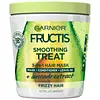What's inside
What's inside
 Key Ingredients
Key Ingredients

 Benefits
Benefits

 Concerns
Concerns

 Ingredients Side-by-side
Ingredients Side-by-side

Water
Skin ConditioningCetearyl Alcohol
EmollientGlycerin
HumectantIsopropyl Myristate
EmollientStearamidopropyl Dimethylamine
EmulsifyingButyrospermum Parkii Butter
Skin ConditioningOlea Europaea Fruit Oil
MaskingGlycine Soja Oil
EmollientSodium Hydroxide
BufferingRosmarinus Officinalis Leaf Extract
AntimicrobialCoco-Caprylate/Caprate
EmollientCocos Nucifera Oil
MaskingHydroxypropyl Guar Hydroxypropyltrimonium Chloride 2%
Citric Acid
BufferingTartaric Acid
BufferingCetyl Esters
EmollientCaramel
Cosmetic ColorantParfum 2%
MaskingWater, Cetearyl Alcohol, Glycerin, Isopropyl Myristate, Stearamidopropyl Dimethylamine, Butyrospermum Parkii Butter, Olea Europaea Fruit Oil, Glycine Soja Oil, Sodium Hydroxide, Rosmarinus Officinalis Leaf Extract, Coco-Caprylate/Caprate, Cocos Nucifera Oil, Hydroxypropyl Guar Hydroxypropyltrimonium Chloride 2%, Citric Acid, Tartaric Acid, Cetyl Esters, Caramel, Parfum 2%
Butyrospermum Parkii Butter
Skin ConditioningJojoba Esters
EmollientPersea Gratissima Oil
Skin ConditioningOlea Europaea Fruit Oil
MaskingParfum
MaskingAvena Sativa Kernel Oil
Skin ConditioningCarapa Guaianensis Seed Oil
Skin ConditioningMacadamia Integrifolia Seed Oil
Skin ConditioningPrunus Armeniaca Kernel Oil
MaskingAloe Barbadensis Leaf Juice
Skin ConditioningOcimum Basilicum Leaf Extract
Skin ConditioningPiper Nigrum Seed Extract
RefreshingRosmarinus Officinalis Leaf Extract
AntimicrobialSalvia Officinalis Leaf Extract
CleansingHelianthus Annuus Seed Oil
EmollientIsopropyl Myristate
EmollientTocopherol
AntioxidantLimonene
PerfumingLinalool
PerfumingCI 77491
Cosmetic ColorantButyrospermum Parkii Butter, Jojoba Esters, Persea Gratissima Oil, Olea Europaea Fruit Oil, Parfum, Avena Sativa Kernel Oil, Carapa Guaianensis Seed Oil, Macadamia Integrifolia Seed Oil, Prunus Armeniaca Kernel Oil, Aloe Barbadensis Leaf Juice, Ocimum Basilicum Leaf Extract, Piper Nigrum Seed Extract, Rosmarinus Officinalis Leaf Extract, Salvia Officinalis Leaf Extract, Helianthus Annuus Seed Oil, Isopropyl Myristate, Tocopherol, Limonene, Linalool, CI 77491
 Reviews
Reviews

Ingredients Explained
These ingredients are found in both products.
Ingredients higher up in an ingredient list are typically present in a larger amount.
This ingredient is also known as shea butter. It is an effective skin hydrator and emollient.
Emollients help soothe and soften your skin. It does this by creating a protective film on your skin. This barrier helps trap moisture and keeps your skin hydrated. Emollients may be effective at treating dry or itchy skin.
Shea butter is rich in antioxidants. Antioxidants help fight free-radicals, or molecules that may harm the body. It is also full of fatty acids including stearic acid and linoleic acid. These acids help replenish the skin and keep skin moisturized.
While Shea Butter has an SPF rating of about 3-4, it is not a sunscreen replacement.
Shea butter may not be fungal acne safe. We recommend speaking with a professional if you have any concerns.
Learn more about Butyrospermum Parkii ButterIsopropyl Myristate is an emollient, thickening agent, and texture enhancer. It is created from isopropyl alcohol and myristic acid.
It is used to help other ingredients be better absorbed. It is also an emollient and may help soften and hydrate the skin.
The comedogenic rating of this ingredient depends on the concentration. Lower amounts results in a lower rating.
Isopropyl Myristate may not be fungal acne safe. It can potentially worsen acne prone skin.
Learn more about Isopropyl MyristateOlea Europaea Fruit Oil is the fixed oil obtained from the ripe fruit of the Olive. In other words - olive oil.
The primary contents of olive oil are glycerides of the fatty acids linoleic, oleic and palmitic.
Olive oil also contains antioxidants such as Vitamin E. Antioxidants may help reduce signs of aging by fighting unstable free-radical molecules. It also contains Vitamins A (retinol), D, and K.
The squalene in olive oil makes it a great emollient. Emollients help soothe and soften your skin by trapping moisture in. This makes olive oil a great skin moisturizer.
Studies show olive oil to have antibacterial and antifungal properties in low concentrations. Another study found olive oil irritated sensitive oily skin. We always recommend speaking with a professional about using this ingredient in your routine.
Due to the fatty acid content, this ingredient may not be fungal-acne safe.
Learn more about Olea Europaea Fruit OilParfum is a catch-all term for an ingredient or more that is used to give a scent to products.
Also called "fragrance", this ingredient can be a blend of hundreds of chemicals or plant oils. This means every product with "fragrance" or "parfum" in the ingredients list is a different mixture.
For instance, Habanolide is a proprietary trade name for a specific aroma chemical. When used as a fragrance ingredient in cosmetics, most aroma chemicals fall under the broad labeling category of “FRAGRANCE” or “PARFUM” according to EU and US regulations.
The term 'parfum' or 'fragrance' is not regulated in many countries. In many cases, it is up to the brand to define this term.
For instance, many brands choose to label themselves as "fragrance-free" because they are not using synthetic fragrances. However, their products may still contain ingredients such as essential oils that are considered a fragrance by INCI standards.
One example is Calendula flower extract. Calendula is an essential oil that still imparts a scent or 'fragrance'.
Depending on the blend, the ingredients in the mixture can cause allergies and sensitivities on the skin. Some ingredients that are known EU allergens include linalool and citronellol.
Parfum can also be used to mask or cover an unpleasant scent.
The bottom line is: not all fragrances/parfum/ingredients are created equally. If you are worried about fragrances, we recommend taking a closer look at an ingredient. And of course, we always recommend speaking with a professional.
Learn more about ParfumRosmarinus Officinalis Leaf Extract comes from rosemary. Rosemary is native to the Mediterranean.
While Rosmarinus Officinalis Leaf Oil can be volatile due to its fragrant properties, the fragrance components are usually removed in the leaf extract.
Rosemary Leaf Extract contains many antioxidants such as rosmarinic acid and caffeic acid. Rosemarinic acid, a compound found in rosemary leaf, has been found to help soothe skin conditions such as eczema and acne.
Learn more about Rosmarinus Officinalis Leaf Extract